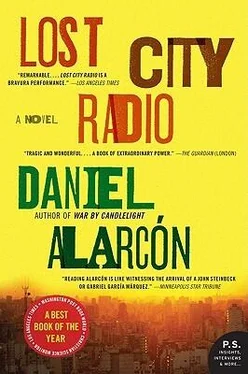“That’s cruel,” Manau said.
“I thought so too.”
“But?”
“But the longer the show has gone on, the more I understand it. There are people out there who think of themselves as belonging to someone. To a person who, for whatever reason, has gone. And they wait years: they don’t look for their missing, they are the missing.”
She looked at Manau, unsure of what she expected from him. In a room just like this one, Rey had told her he loved her. “Is he alive?” she asked Manau suddenly. “Tell me, if you know. If you know, you have to tell me.” She didn’t want to cry, but she couldn’t help it.
“I don’t know,” Manau said. “No one does.”
THE WEEK of the Battle of Tamoé, the show was canceled. It was simply too difficult to screen calls. The answering machine filled up with the voices of worried, anxious mothers: there were tanks in the streets, and their boys had left to fight with ancient rifles that didn’t fire straight. Something was happening, and it was out of control. The district was being razed. News reports of the four-day battle were prepared at the Ministry of State, sent to the radio to be read as is, without comment, without any additional reporting. Elmer consulted with the senator, who asked the station to comply. Everyone knew of the little girl who had died, but she was not mentioned. In the official telling of it, the terrorized residents of Tamoé had asked the army to clear out the menacing IL. The Central Highway would be closed for the duration of the military activities, and emergency price controls placed on basic necessities. When this action was concluded, the radio announced, the war would be, for all intents and purposes, over.
Norma’s hour that Sunday was replaced by a prerecorded program of indigenous music. She had asked Rey, before he left for the jungle, if he ever came across a radio in the different villages he passed through. He said he never had.
“I would have sent you a message,” she said.
“You still can.”
So, from her perch above the city, Norma imagined him out there — where exactly? — listening to the radio, surprised to find that her show had been preempted, that the war was ending. Mornings, she read the news from Tamoé: it was spotty and deliberately vague, but someone like Rey would know enough to tell what was really happening. He knew the district, he knew what it meant when she said that the forces of order had advanced past Avenue F–10. He would know the center of the district had fallen, that what fighters were left had been chased into the hills. He would know that the government would not announce victory unless it was in hand. She hoped then that he wasn’t listening, that he was in the forest he loved, among the plants and the trees and the birds, that he would miss these unhappy days altogether, and return to the city only when it was finished, when there was nothing left undone.
By the middle of the second day of shooting, Elmer began making small changes to the prepared texts: fighting raged instead of continued . When these passed by unnoticed, he began culling some safe statements from the Lost City Radio answering machine, to be played on the air as firsthand accounts. In this way, the station was the first to report on the fires. Norma herself took some calls, listened as one or another desperate resident described the inferno that was beginning to remake the landscape of the district. They want our land, the callers said, they want our homes. The fire was still in the lower neighborhoods of Tamoé, and in the slums that bordered the Central Highway, but it was moving up the hill, and north from the highway. One caller after another made the same accusation: it was the army. They were setting fire to everything. They were bulldozing homes and setting fire to the rubble. At night, from the conference room, you could see the eastern district smoldering. By day, the smoke hung over the city, but was not mentioned in the newspapers or on most radio stations.
In 1797, the people gathered in the canteen to listen to Zahir’s radio. The reception wasn’t bad, and everyone took turns admiring the machine. Zahir, with whom Rey had spoken a handful of times, sat next to it, gracefully accepting congratulations on his purchase. By the third day, they were calling it the Battle of Tamoé on the radio, and the news was exclusively of a great fire. The shooting had stopped. In 1797, the villagers were crowded in — children, too, sitting under the tables, among their parents’ feet, or balanced on the windowsills. A soft rain fell, and Zahir turned up the volume of his new machine so they could hear, over the pitter-patter on the metal roof, about the latest block to fall to the army, or the newest official count of dead.
They listened as if it were a sporting match in which they had not taken sides. One woman thought she had a son who lived in this place — Tamoé?—but she couldn’t be sure. She sat uncomfortably, pulled a strand of her hair into her mouth and sucked on it nervously. She accepted condolences from the gathered crowd; her worry was authentic and her sadness complete.
Rey sat among them, unnoticed at first, but as the afternoon became evening, something changed. They had in their midst a real expert: the villagers were watching him. Finally, someone addressed Rey directly: an elderly woman whose voice he had never heard before. “Where is this Tamoé?” she asked.
“Yes,” the adults echoed. “Where is it?”
Rey blushed. “Tell them,” Adela said, and so he had no choice. He stood up, walked to the front of the canteen, and was, quite suddenly, a professor again. He had been a teacher all his adult life. His father was a teacher, and his father’s father, too, back when the town Rey had abandoned at age fourteen was a village no larger than 1797. Rey cleared his throat. “It’s the edge of the city,” he said, “north of the Central Highway, in the foothills of the eastern mountains.”
It meant nothing to them. “Is there a map I could use to show you?” he asked.
There was laughter: a map? Of the city — who would have such a thing? Adela had a map of the country, of course; he’d brought it himself.
The questions came furiously. Yes, he knew of it. Yes, he had been there. Was it big? He had to smile: compared with the village where they all sat, how could it be anything but? Hands shot up, and he did his best to keep pace. Who lives there? What kind of people?
“Poor people,” Rey said, and the men and women nodded.
“Where are they from?”
“They come from all over the country,” he said. The mountains, the jungle, the decaying towns of the north. From the abandoned sierra.
He was very polite, or tried to be, but the questions kept coming. Someone had turned the radio down: Rey could hear his wife’s voice, but couldn’t concentrate on the words. They wouldn’t let him listen. The villagers knew nothing about the war, and here they were, awaiting its end, wanting quite suddenly to know everything about it.
“How did it begin?” a man asked. He wore his black hair in a braid.
“I don’t know,” Rey said, and there was a clatter of protest. Of course he knew!
Which grievance was it and when? Had it begun that night he spent in jail as a boy? Sleeping next to his father on the damp floor, while an angry mob clamored for his punishment? Before that, long before that: everyone knew it was coming. But it had officially begun ten years ago, he told them. Nearly a decade. How? He forgot now. Someone was angry about something. This someone convinced many hundreds and then many thousands more that their collective anger meant something. That it had to be acted upon. There was an event, wasn’t there? Violence to mark a fraudulent election? An explosion timed to commemorate some patriotic anniversary? He thought he remembered an opposition leader, a politician well known and admired for his honesty, being poisoned, dying slowly and very publicly over the course of three weeks. The name escaped him now. Was this how it began? He didn’t know what to tell them, this roomful of curious faces; the radio turned down to a low buzzing and the evening having evolved into a disquisition on recent national history by an anonymous city-dweller. It was useless to plead ignorance in this setting. No one would believe him. The war, he decided, would have happened anyway. It was unavoidable. It’s a way of life in a country like ours.
Читать дальше












